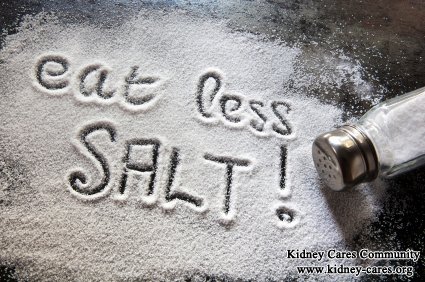 Search
Search
 Search
Search
 Whether for healthy people or kidney disease patients, low-salt diets should be advocated because high-salt diets can cause hypertension, kidney disease, diabetes and other cardiovascular diseases.
Whether for healthy people or kidney disease patients, low-salt diets should be advocated because high-salt diets can cause hypertension, kidney disease, diabetes and other cardiovascular diseases.
The latest report in WTO recommended daily salt intake should be less than 6g. For kidney disease patients, daily salt intake should be even less especially if patients have swelling or high blood pressure. Too much salt can worsen high blood pressure, speed up glomerular sclerosis and further aggravate renal damages.
Low-salt diets are mainly apply to heart disease, kidney disease, liver cirrhosis with ascites, severe hypertension and swelling. Pickled foods (pickles, hams, sausage, etc), restaurant foods and highly processed foods should be avoided.
The damages of excessive intake of salt
Too much salt can cause loss of potassium which can cause weakening of heart muscles and heart functions.
High-salt eating habit can cause osteoporosis. Too much salt in diets can increase the excretion of calcium. It can also stimulate parathyroid can increase parathyroid hormone which can damage dynamic balance of bone metabolism and make patients more susceptible to osteoporosis and bone fracture.
High concentration of sodium in the body can inhibit the activity of respiratory cells and lower cellular immunity. It can reduce lysozyme and saliva secretion in the month. All these increase the risk of catching cold.
It has been studied that 1g salt can absorb about 200-300ml water. Therefore the more salt we eat, there will be more fluid retention. This will increase blood volume and increase vascular resistance, that is why blood pressure will be elevated. The normal metabolic orders will be disturbed and the risk of cardiovascular diseases and heart failure will increase.
For children, healthy dosage of salt is very important for protecting their immature viscera. Their kidneys are still growing and are unable to discharge excessive sodium from the blood. Their proper salt intake is several times lower than that of adults or it might cause renal failure in children.
How to ensure a low-salt diets for kidney disease patients?
Consult a dietitian to determine your personalized proper salt intake;
Avoid eating outside and avoid processed foods which often contain rich sodium;
Have more fresh vegetables and fruits and cook dishes according to your illness conditions;
Use other seasonings to substitute salt such as some Chinese herbs.